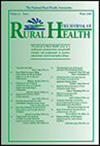Cognitive impairment and limited health literacy are associated with poor health outcomes among patients with heart failure residing in rural areas
Abstract
Background
Cognitive impairment and limited health literacy are prevalent among patients with heart failure, particularly those residing in rural areas, and are linked to poor health outcomes. Little is known about the intricate relationships among cognitive function, health literacy, and rehospitalization and death in rural patients with heart failure.
Objectives
To determine the relationships among cognitive function, health literacy, and cardiac event-free survival (ie, heart failure hospitalizations and cardiac mortality) in rural patients with heart failure.
Methods
This was a secondary data analysis of a randomized controlled trial of 573 rural patients with heart failure. Cognitive function was measured using the Mini-Cog test. Health literacy was measured by the Short Test of Functional Health Literacy in Adults. Cardiac event-free survival was followed for 2 years. Survival analyses (ie, Kaplan-Meier plots with log-rank test and Cox regression) were used.
Results
Cognitive impairment was associated with limited health literacy. Cognitive impairment and limited health literacy predicted worse cardiac event-free survival (P<.05). Patients with both cognitive impairment and limited health literacy had a 2.24 times higher risk of experiencing a cardiac event compared to those without cognitive impairment and with adequate health literacy (P<.001).
Conclusions
Patients with cognitive impairment and limited health literacy were at the highest risk of experiencing a cardiac event. It is important to screen rural patients with heart failure for cognitive impairment and limited health literacy. Interventions to improve outcomes need to be developed to target rural patients who have heart failure with cognitive impairment and limited health literacy.

 求助内容:
求助内容: 应助结果提醒方式:
应助结果提醒方式:


